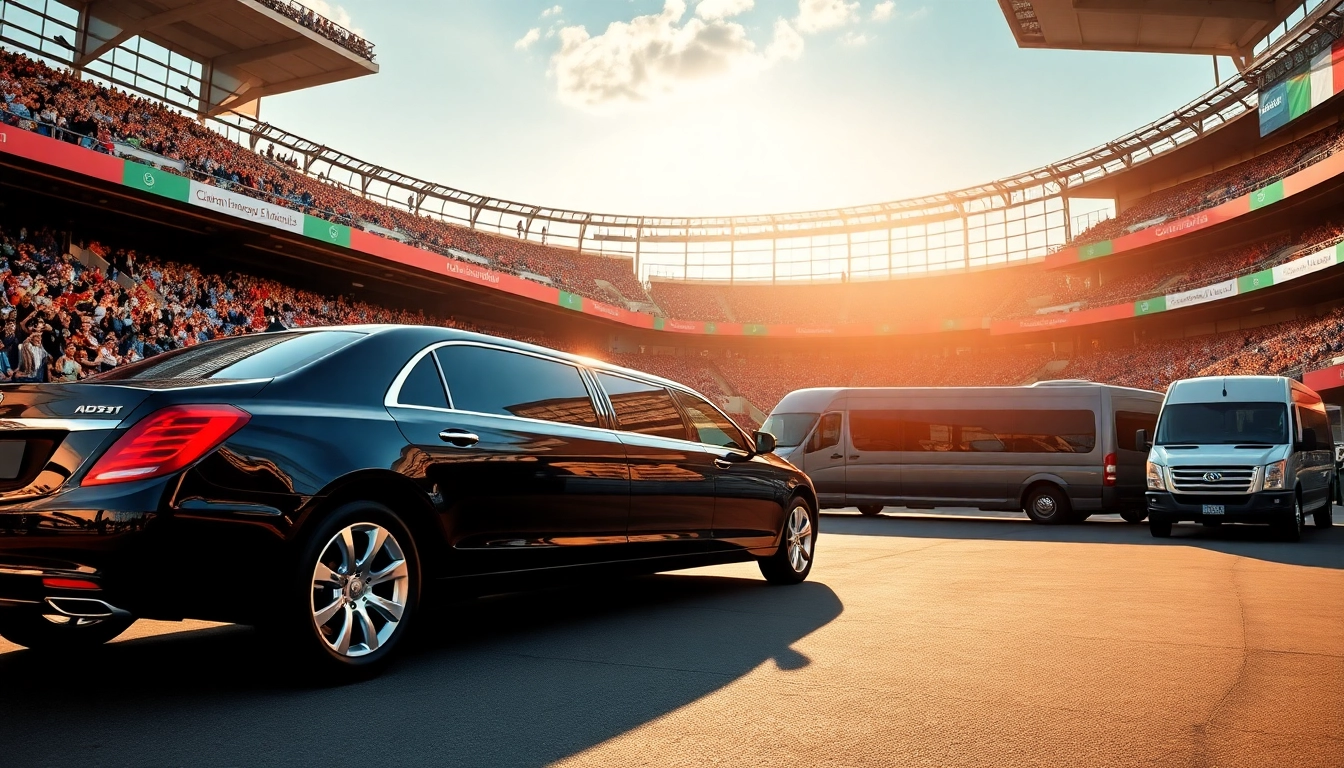Understanding Event Transportation Needs
When planning an event, particularly one as dynamic as a sporting event, understanding the intricacies of event transportation is crucial. The mode of transportation not only affects the logistics of the event but also significantly impacts attendee experience. Ensuring that guests arrive punctually, comfortably, and safely sets the stage for an enjoyable occasion. Whether it’s a local soccer match, a major league game, or a community marathon, each sporting event requires tailored transportation solutions.
Types of Event Transportation
Event transportation encompasses various options, each suited to different types of gatherings and needs. The common types include:
- Buses: Ideal for large groups, buses can accommodate dozens of people and offer a cost-effective solution for transporting teams, fans, and officials.
- Shuttles: These smaller vehicles are perfect for short distances, such as running between venues or from parking lots to entrances, providing convenience for quick trips.
- Luxury Cars and Limousines: For VIPs and high-profile guests, luxury vehicles provide an elevated experience with comfort and style.
- Vans: Smaller than buses but larger than cars, vans are versatile for both group transportation and special requests.
- Rideshare Services: Popular among younger attendees, rideshare apps give individuals flexibility in their travel arrangements.
Common User Challenges in Planning
Even with a clear understanding of available transportation options, many challenges can impede effective planning. Common obstacles include:
- Budget Constraints: The availability of funds often limits the choice of vehicles and services, requiring creative solutions.
- Timing Issues: Coordinating multiple arrivals and departures can be difficult, especially with large crowds.
- Route Planning: Identifying the quickest routes and accounting for traffic can require thorough research and ongoing communication with transport services.
- Special Needs: Accommodating guests with disabilities or those requiring special transportation needs can complicate logistics.
How to Identify Your Transportation Requirements
Identifying specific transportation needs starts with a thorough analysis of the event. Consider the following steps:
- Assess Attendee Numbers: Estimating the number of attendees helps determine required vehicle types and quantities.
- Evaluate Location: The proximity of venues, parking facilities, and public transport links plays a crucial role in planning logistics.
- Understand Timing: Creating a timeline that accounts for arrival, event start times, and departure will influence scheduling transportation services.
- Gather Guest Requirements: Surveying attendees about their needs and preferences can help tailor transport solutions, ensuring satisfaction.
Benefits of Professional Event Transportation Services
Utilizing professional event transportation services offers numerous advantages that can significantly enhance the overall experience for all participants. These benefits include:
Enhanced Guest Experience with Comfort
Professional transportation ensures guests enjoy a comfortable journey, reducing the stress often associated with travel during events. From spacious seating to climate control, luxury vehicles provide amenities that enhance the overall experience.
Time Management and Stress Reduction
By outsourcing transportation planning to professionals, event organizers can focus on other aspects of the event. Expert logistics managers understand how to optimize schedules to minimize waiting times and delays, ensuring that guests feel relaxed and ready to enjoy the sporting action.
Safety and Reliability in Transportation
One of the foremost benefits of hiring professional services is the commitment to safety. Qualified drivers familiar with traffic patterns and regulations help ensure that attendees reach their destinations without hassle, thus mitigating risks associated with self-driven travel.
Choosing the Right Vehicle for Your Event
Choosing the right vehicle is pivotal in successfully executing event transportation. Several factors need to be considered to make the most suitable selection.
Factors to Consider When Selecting Vehicles
Beyond merely accommodating guest numbers, consider the following criteria when selecting vehicles:
- Event Type: The nature of the event can dictate vehicle choice; formal events may require luxury options, while casual outings might benefit from more economical transport.
- Distance: Longer distances may necessitate more comfortable vehicles, whereas shorter trips could allow for smaller, less luxurious options.
- Accessibility Needs: Ensure the vehicle can accommodate attendees with mobility issues if needed.
Luxury Options vs. Economical Choices
Deciding between luxury and economical transportation has much to do with your event’s branding and audience. Luxury options can attract high-profile guests, enhancing their experience, while economical solutions can be effective for school sports events or community gatherings.
What Size Vehicle Do You Need?
Understanding the number of attendees is crucial. Here’s a breakdown to guide vehicle selection:
- Up to 10 Passengers: Standard luxury sedans or SUVs are appropriate.
- 11 to 25 Passengers: Vans or shuttle buses can efficiently transport this group size.
- More than 25 Passengers: Buses or large charter services are the best options for larger groups.
Planning Your Event Transportation Logistics
Planning is a multi-faceted process that requires careful consideration of various elements to arrive at an effective transportation strategy.
Creating an Efficient Timeline
Developing a timeline is essential. This should include the following:
- Vehicle arrival times.
- Scheduled departure times before events.
- Entry points for drop-offs and pick-ups at the event venue.
Communication and Coordination with Transport Services
Continuous communication with transportation providers is crucial for ensuring alignment on schedules and changes, especially if there are unexpected shifts such as a change in event timing or guest arrival patterns.
Post-Event Transportation Considerations
The journey doesn’t end when the event wraps up. Plan for how attendees will return home or to their accommodations post-event, using feedback gathered during the event to improve logistics for future gatherings.
Measuring Success of Event Transportation
To improve future event transportation strategies, it’s imperative to analyze the success of current efforts. This can be accomplished by gathering feedback and assessing various metrics.
Gathering Feedback from Attendees
Surveys can provide insights into guests’ experiences. Encourage attendees to share their thoughts on comfort, punctuality, and overall satisfaction with transportation services. Knowing how well expectations were met can inform future planning.
Analyzing Transportation Efficiency Metrics
Key performance indicators (KPIs) should be established to assess the effectiveness of transportation logistics. Important metrics might include:
- Average wait times.
- Punctuality of rides according to schedule.
- Guest satisfaction ratings.
Improving Future Event Transportation Strategies
Utilizing the data gathered from feedback and efficiency metrics allows event planners to identify opportunities for improvement. Adjusting routes, identifying peak travel times, and modifying vehicle types can lead to more streamlined operations, ultimately enhancing the experience for future events.



